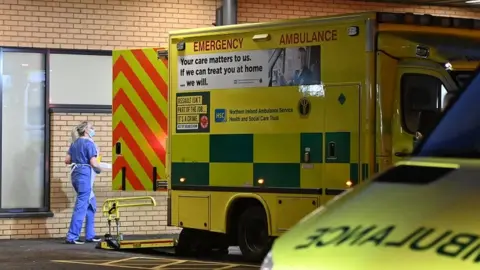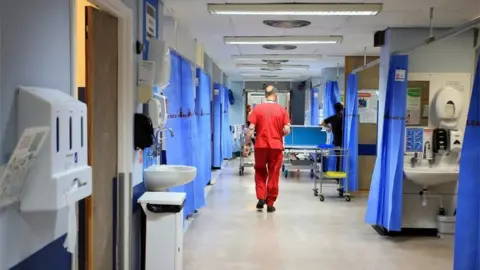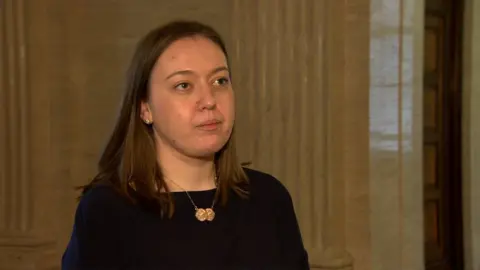Antrim Hospital staff 'traumatised' by pressures
 Pacemaker
PacemakerStaff at Antrim Area Hospital were "traumatised" by the considerable pressure of patient numbers on Tuesday, its emergency department manager has told BBC News NI.
A potential major incident was declared when the hospital had no available beds.
Bronagh Gilmore said there was "no physical space to stand, never mind to receive critically ill patients".
The incident, a rare event, was stood down on Tuesday evening.
This announcement is one step below a major incident, which means there are too many patients for staff to deal with safely.
The announcement at Antrim Area Hospital came as other trusts warned of increasing pressure across Northern Ireland's hospitals.
On Tuesday, the South Eastern Trust and the Western Trust made staff appeals on social media for the Ulster Hospital and Altnagelvin Hospital, with the South Eastern Trust reporting "extreme pressures".
The Belfast Trust has urged patients who are fit for discharge to "help free up beds" by leaving its hospitals.
In a social media post, the trust said Covid-19 was a "real concern" with more than 150 patients testing positive.
Allow X content?

Northern Trust's director of operations, Wendy Magowan, said Antrim Area Hospital had "two-and-a-half wards worth" of patients in its emergency department when the incident was declared.
At one point, there were 62 patients delayed in the emergency department, many of whom had been there more than 12 hours and some for a number of days.
She added that 661 out of 12,000 staff were off due to Covid-19 or self-isolation across the trust.
'Department under considerable pressure'
Ms Gilmore explained that "it's been relentless pressure and Covid has exacerbated that over the past two years".
She said there were eight to 10 ambulances with patients to be offloaded and up to 10 patients on trolleys waiting to be seen or go to wards when she came into work on Tuesday morning.
The resuscitation room, including a paediatric bed occupied by an adult, was also full, she added.
"Night staff were going off and were totally traumatised," Ms Gilmore said.
"They had tried to nurse critically-ill patients among 60 patients waiting to go to wards.
"The department was under considerable pressure."
Dr Eimhear Kearney, a consultant in the emergency department, described Tuesday as "the straw that broke the camel's back" and said the potential major incident declaration was a "flare for help".
It was aimed at both the trust internally, but also for help elsewhere, which she said the hospital did receive despite pressures experienced in other trusts.
Tuesday was "not a single event", but one that had "been building for some time", she added.
 PA
PA"We've been struggling at full capacity now for months," Dr Kearney explained.
Ms Magowan said the hospital's move had been a last resort and that pressure had been building.
'Really sick patents'
She said the hospital's clinical director felt that the emergency department "required support to get some space to allow patients to come in and be safely treated".
"I am talking about really sick patients here, I am talking about stand-by calls, possible heart attacks and strokes, all sorts of situations."
Ms Magowan said that more than a quarter of the hospital's patients - 86 - have tested positive for Covid-19, though not all are being treated for Covid.


I think what happened yesterday was really significant.
We frequently hear that the system is close to breaking point and I think yesterday parts of that system actually snapped.
The health system is groaning under tremendous pressure at the moment, people working in Antrim Area yesterday said it was one of the worst days in years, there were just too many sick people and not enough hospital beds to admit them to
A nurse in Antrim Area Hospital said it has been relentless for years, even before Covid.
So why yesterday? I get the impression that a lot of senior staff simply had had enough.
If we look specifically at Antrim Area Hospital and Craigavon there are simply not enough hospital beds in the system for the size of the population.
In a recent report by the Royal College of Surgeons the average number of hospital beds has shrunk by well over 1,000 in 10 years while populations are rising.

On Wednesday, Jenny Nicholson, the lead nurse at the Ulster Hospital in Dundonald, said there had been "sustained pressure for a number of weeks".
As of 17:15 GMT, she told BBC News NI's Evening Extra programme there were 115 patients waiting in the emergency department.
The longest wait was about 52 hours, most of which was waiting for a bed on a ward.
Thirty-seven patients had been waiting for more than 12 hours for a hospital bed.
Ms Nicholson said "staff are struggling" with the pressure, but her colleagues are a "fantastic team who work so hard and work well together".
Earlier, Ulster Hospital consultant Andrew Dobbin said: "I think the pressures have been significant and have been going on for around a year.
"Our department today will be expecting to see around 300 patients and receive 50 ambulances."
Dr Brendan Lavery, a Western Trust emergency department consultant, said more than 200 patients had presented to the department at Altnagelvin on Monday and Tuesday.
"Those needing to be admitted were faced with delays in getting a hospital bed," he explained.
"Part of the issue is that Covid is still a problem," the consultant told BBC Radio Foyle.
Dr Lavery said the health service required "planned change" rather than "emergency change when services fall apart".
Ray Rafferty, from health union Unison, said there were 62 patients waiting on trolleys on Wednesday morning.
"The hospitals in Belfast are full," he said.
"The main problem that we have is the number of unscheduled patients having to attend hospital because they haven't been able to get primary care."
What political reaction has there been?
On Wednesday, Sinn Féin assembly member (MLA) John O'Dowd blamed the Democratic Unionist Party's (DUP) decision to collapse the executive with the resignation of the first minister for holding back progress on a budget to deal with health pressures.
"The DUP needs to come back to work, they need to come back to the executive table. We need to get the budget agreed," he told BBC News NI.

DUP assembly member Deborah Erskine said Health Minister Robin Swann should bring a "road map" to the assembly about what steps he will take.
Ulster Unionist assembly member Alan Chambers, a party colleague of Mr Swann, said the minister was not to blame and responsibility lay "squarely on the shoulders of the DUP by pulling out of the executive".
Social Democratic and Labour Party (SDLP) assembly member Colin McGrath said the political system had "let people down in terms of health", while Alliance Party MLA Paula Bradshaw said healthcare needed to be "transformed" alongside dealing with the "rebuild after Covid".
